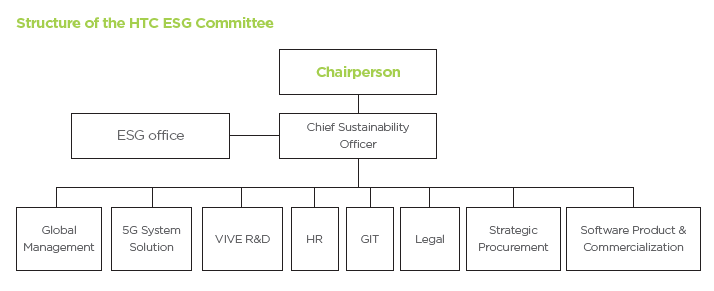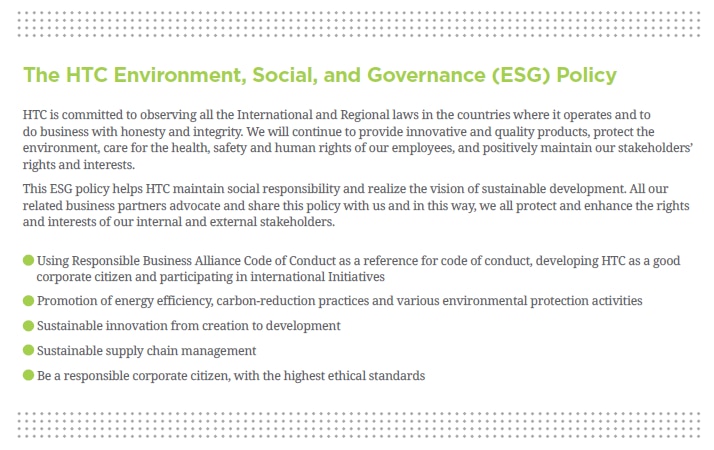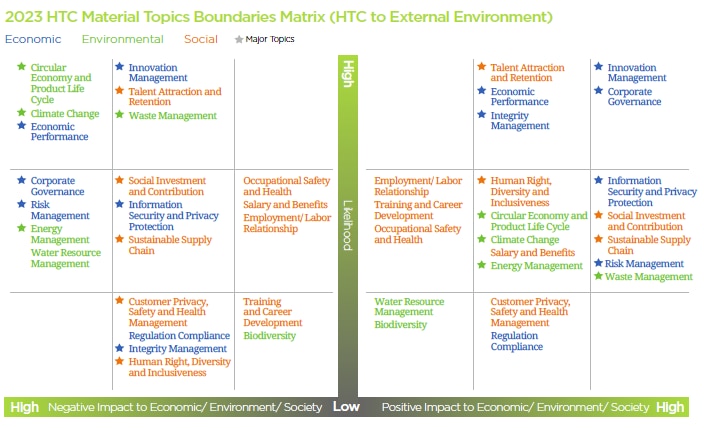ESG Committee

In early 2022, HTC escalated the original CSR Committee to ESG Committee with Chairwoman Cher Wang as the Chair of Committee, SVP Madeline Chen as Chief Sustainability Officer, and members of executives as ESG committee members. The committee is responsible for decision-making on economic, environmental and social topics, and founded the ESG Office to assist in formulating sustainable strategies, connect sustainable development issues from various departments, and continue to promote sustainable development responsibilities. The ESG office is responsible for connecting HTC and external stakeholders, including the communication and feedbacks from important supply chain partners. Also regularly report to the ESG Committee on the trends, impacts and performance of relevant sustainability topics. There are several task forces under the committee to deal with various ESG issues and link up the sustainable development goals of various departments. Through a clear organization and division of labor, taking into account the economic, environmental and social aspects, and implementing the sustainable management of enterprises in daily operations with practical actions.
The Board of Directors is responsible for supervising the overall ESG management policy, strategy and target setting, and major decision-making, as well as overseeing the effective operation of the ESG management mechanism at HTC. Chief Sustainability Officer reports to the Board of Directors from time to time every year. The ESG committee held its first meeting in March 2022, during which it decided on the ESG focus planning items for the year and assigned dedicated representatives from the committee to form an ESG work group responsible for promoting ESG focus work items. The ESG work group conducts review meetings every two weeks to review the progress of each project.

Our Sustainability Commitment

Our Human Right Commitment:
According to the
"United Nations Global Compact”
and
“United Nations Universal Declaration of Human Rights.”
, we are committed to upholding the fundamental principles of human rights for all of our workers and through daily operational practices. For HTC, we comply with local regulations and avoid human rights violations through regular assessments. We also provide grievance channels to identify potential risks. For our employees, HTC has an Employee Code of Conduct, which regulates all legal rights, interests and structures appropriate to follow. For our suppliers, we have a Supplier Code of Conduct, which will take responsibility for supply chain management and require suppliers to avoid any incidents that violate human rights to ensure sustainable and positive social development.
Our RBA Commitment:
As an Affiliate Member of the Responsible Business Alliance (RBA), HTC fully supports the vision and goals of the RBA:
Vision:
A coalition of companies driving sustainable value for workers, the environment and business throughout the global supply chain.
Mission:
Members, suppliers and stakeholders collaborate to improve working and environmental conditions and business performance through leading standards and practices.
HTC commits to progressively align its own operations with the provisions of the RBA Code of Conduct and to support and encourage its own first-tier suppliers to do the same.
Wherever possible, HTC will seek to adopt the RBA approach and tools in practical ways in the spirit of the industry’s common goals.
ESG Management Procedures and Systems
HTC’s ESG topics management uses materiality analysis as an important guideline for formulating long-term sustainable goals and communicating with stakeholders. In materiality analysis, GRI guidelines and AA1000 AP 2018 responsibility principle standards are adopted, and the four principles of inclusiveness, materiality, responsiveness, and impact are used to respond to the needs of stakeholders and focus on the disclosure of major topics, and these are further used for the judgment of disclosure of relevant actions, performance and results.
Based on industry and operating activities, as well as indicators such as interaction with the company, dependence, responsibility, attention, and influence, HTC evaluates stakeholders from multiple perspectives and identifies six key stakeholders in 2023, including (1) employees, (2) suppliers/contractors, (3) consumers/customers, (4) shareholders and investors, (5) local communities/ academic institutions & NGOs, (6) government regulatory agencies.
In addition to stakeholders, we also consider product services and operating activities, business relationships with the value chain, interested entities related to HTC (including subsidiaries and affiliated companies), sustainability context and human rights topics and etc. Based on GRI, SASB indicators, domestic and foreign corporate trends, peer ESG reports and other indicators, screen the issues of concern, focus on sustainable topics that are highly relevant to the company covering economic, environmental, and social aspects, and distribute questionnaires to each stakeholder. All the items in the questionnaire use the two major indicators of impact and possibility, and provide them to stakeholders in a 0~5 point manner to identify possible or existing impacts.
After the candidate major topics of positive and negative impacts were generated, a major topics discussion meeting was held internally, and the Chief Sustainability Officer also attended the discussion. The meeting discussed according to the company’s development strategy, industry status, value chain practice and expert advice to confirm the degree of impact and positive/ negative/ potential impact of topics on the economy, environment, society and human rights, identified and ranked major topics of the year. The ESG Office reports the results to the Audit Committee for presentation to the Board of Directors, and serves as the main line of information disclosure in this annual ESG Report.


In addition, to ensure that the policies and decisions of the ESG Committee can be put into practice, we have divided ESG activities into four areas, “green products, environmental protection, occupational safety & health, and social responsibility,” and have set up a dedicated management system for each. These have been verified as aligned with the applicable international regulations and standards, and help integrate company policy for sustainability and social responsibility into our daily operations.
ESG related management system and initiative